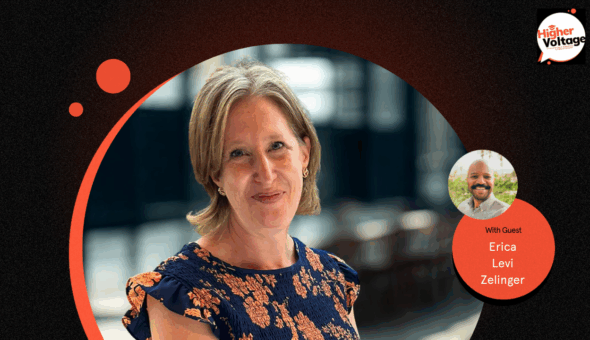Dr. William ‘Brit’ Kirwan, chancellor emeritus of the University System of Maryland, joins host Kevin Tyler to discuss university presidents’ precarious position when they make or abstain from statements on emotionally charged issues.
Dr. Kirwan also gives his thoughts on the “U.S. News Syndrome” that has eroded public trust of the higher education industry, and what he believes should be done to fix it.
Show Notes
- Communication Breakdown: The Strain of Responding to Crises Like the Israeli-Hamas Conflict
- The Israel-War Email That College Presidents Should’ve Sent
- University leaders search for the right words amid Israel-Gaza war
- A History of Commitment to Free Expression
Read the full transcript
Kevin Tyler:
Welcome back to Higher Voltage. I am pleased to introduce our next guest, William Brit Kirwan, Chancellor Emeritus of the University System of Maryland. He is a nationally recognized authority on critical issues facing higher education, has served as chancellor of the University System of Maryland, president of the Ohio State University and president of the University of Maryland College Park.
Dr. Kirwan is past chair of the American Council on Higher Education, the Association of Public and Land Grant Universities, the American Association of Colleges and Universities, the Business Higher Education Forum and the National Research Council Board on Higher Education and Workforce.
He also served as the co-chair of the Knight Commission on Intercollegiate Athletics from 2004 to 2016. And presently, he chairs a statewide commission on innovation and excellence in education, which has been asked to make recommendations to the governor and general assembly that would enable Maryland schools to perform at the level of the world’s best school systems. I am so pleased to welcome Brit Kirwan to Higher Voltage. Thank you for joining us today.
Brit Kirwan:
Kevin, it’s a real pleasure to be with you. Look forward to our conversation.
Kevin Tyler:
We wanted to have this conversation as soon as possible because, as we all know, the majority of the news cycle in October was about the Israel-Hamas-Gaza war. And I wanted to not have a conversation about people’s stance on this issue but more about how it is impacting college campuses across the country.
As you know, college campuses have a bunch of different student groups. And what we are seeing in the last couple of weeks, especially, is a push and a desire for college and university leadership to take some sort of stand, to make some sort of statement about what is going on in Israel and Gaza at the moment.
As someone who has had a long career in higher education at various levels of leadership, I really wanted to have this conversation with you to see how you kind of assessed those opportunities when global issues such as this one were going on and impacted your campus. Can you talk a little bit about your experience there?
Brit Kirwan:
Yes, well, this is a very, as you noted, a very timely and important discussion. And I think presidents have been caught in a very difficult situation because it’s hard to imagine a more complicated issue to speak on than the one that presidents are facing today, than this conflict in Israel, because there’s sort of the immediate that has happened, which is horrific, but it’s happening in the context of a long history. And, so it just complicates the ability to say something intelligent, as the president of the University of Pennsylvania, Harvard, Princeton have all found out, and presidents across the country.
My own thinking on this issue has evolved over time. I’ve come to the point of view that presidents need to be extremely circumspect and cautious about speaking out on issues for a whole variety of reasons that we can get into. In fact, the experience we’re going through right now will probably get universities and presidents to perhaps rethink their role in making some formal statement about complicated political and social issues. That doesn’t mean the president shouldn’t be visible and engaged on the campus, but that’s different than having some formal statement condemning or applauding or whatever on a political or social issue.
As I say, I do think this is a topic that’s going to cause some rethinking on college campuses. And there’s actually a very relevant model that maybe we could talk about a little bit that occurred at the University of Chicago in an earlier era.
Kevin Tyler:
Yes, I’m excited to chat with you about that. Before we get to that, though, I wanna just kind of do a super quick rundown. This is not an inclusive list or a comprehensive list of all the things that we’ve seen on college campuses, but we’ve seen fights breaking out at Tulane. We’ve got some situations at George Washington with some statements that were made there. We’ve got groups assembling at UCLA. We’ve got students from 100 colleges across the country who are planning a walkout.
Columbia has postponed some fundraising drives that they had planned because of these kinds of conversations. As you mentioned, Harvard and Penn have been criticized for their response. We have these examples that are very easy to Google.
But we also have a rise in anti-Semitism. And so there’s another version or another thing that’s tied to what we’re seeing in terms of these protests and demonstrations. And higher education campuses have been so critical to revolution. We’ve seen so many revolutions take place or be participated in from a college campus. And so, in your tenure as a higher education administrator and leader, I’m curious if you can talk about the idea that college presidents have a moral obligation; some think that presidents have a moral obligation to speak to and respond to issues like this. And if you could share your take around how you assessed similar landscapes when you were leading institutions.
Brit Kirwan:
Yeah, well, you know, one of the benefits I have of being a very senior higher education leader, my early days in higher education were in the 1960s, where there were enormous demonstrations and protests over affirmative action and rights for African Americans, as well as the Vietnam War. And what we’re seeing, I have to say, on college campuses right now is really no different than what I witnessed as a young faculty member at the University of Maryland in those days. I mean, demonstrations, I was at the University of Maryland College Park, Baltimore Avenue runs right by the campus. Students shut it down. The governor had to send in the National Guard too. Classes got closed and canceled. So, it’s not in many ways surprising that we’re seeing these kinds of demonstrations and protests on campus. And at a certain level, it’s a very healthy thing.
When violence occurs, or people’s rights to an education are somehow compromised, that’s what can’t be tolerated, and something has to be done. But just the fact that there are these demonstrations and protests, at a certain level, it’s a very healthy thing. Now, to me, the president, when issues like this arise on the college campus and there’s divisions and there’s protests and demonstrations, I think the president being very visible and being engaged in conversations is what is so very, very important. I think making some general statement that’s been vetted by lawyers and others and it’s sort of an antiseptic commentary on some big issue, is, okay, maybe you can feel good for 15 minutes that you put that out, but it has no meaning or bearing, really. But what is more important, I think, is the visibility and the engagement of the president. Maybe I could give one example.
Kevin Tyler:
Oh, please do, yes, of course.
Brit Kirwan:
Okay. So, in doing so, I want to, I have made a lot of mistakes in my career as an administrator, so I am in no way saying I have some special vision of how everything happens should take place. But I do want to give an example to make the point about the visibility and the engagement of the president. So, fairly early in my tenure as the president of the University of Maryland, College Park, the Black Student Union had funds. There were funds allocated to all the recognized student groups to invite in speakers.
And the BSU followed all the protocols, they had the funds, and they invited Louis Farrakhan to come to the campus to speak. And, you have to go back to appreciate the intensity of feelings about Louis Farrakhan because many interpreted his rhetoric as very antisemitic. Very antisemitic. And so when it was announced he was gonna be coming to the campus to speak, there was a huge amount of pressure brought to bear upon me not to let him speak, to rescind his right to speak. And of course, it didn’t take me long to recognize there’s no way I could do that because that is clearly an infringement.
But the campus was in turmoil. Jewish students and other students who opposed Louis Farrakhan were up in arms that I wasn’t doing anything to stop him from speaking, but we allowed this speech to go on. But what I did do was I wrote a letter to the campus newspaper. I didn’t put it in the Washington Post or the Baltimore Sun. I wrote it to the campus newspaper, speaking directly to the students about why it was important; even though I found some of his rhetoric abhorrent, he had every right to express those views and especially on a college campus.
I remember after the tragic killing of Rodney King in Los Angeles, the upset on college campuses around the country. It was unbelievable how angry African Americans and others were at the world and, in particular, at the university. There were protests and demonstrations. It wasn’t just the students. It was the African American faculty and staff and others joining them. And what I did in those days was, they had these protests, I went to the protest, I sat there. We engaged in dialogue. I expressed the pain and anguish that I was feeling over what they were experiencing. And I sat through some, believe me, very, very uncomfortable conversation. But I think it was healthy both for me and it was cathartic for the community. I say that because, of course, if you’ve seen one crisis, you’ve seen one crisis that universities face.
I give these examples, Kevin, because I think it illustrates for the president to be engaged and to be very visible and to participate and express anguish and remorse. But you know, we can get into even the dangers of doing that. And I feel there’s all sort of risk, it can really go south, as it certainly has on a number of campuses that, you know, you were mentioning a moment ago.
Ad Read:
Higher Voltage is brought to you by eCity Interactive. For more than 20 years, eCity has created websites and digital marketing strategies and solutions for colleges and universities that deliver results and exceed expectations. Their latest offerings to higher ed clients include enrollment funnel diagnostics and enrollment support services that efficiently attract and engage potential applicants, with results you have to see for yourself. To learn more, visit ecityinteractive.com.
Kevin Tyler:
I think the points that you raise are really great. I think one of the things that I remember from reading a report about what happened at the University of Missouri after the hunger strikes and the football team walking out, that leadership taking a formulaic and process-driven approach to an emotional thing is never really going to serve the institution well or the communities that are affected. And your comments around being present and being visible is really, I think, the first kind of step in helping a community kind of come to terms with whatever is happening. I think about Brown University and the events that they have had recently around, you know, saying prayers for both Muslim communities and Jewish communities. And it might feel like a small thing. It might feel kind of surface level, but creating spaces for that kind of interaction and discourse is really, really important. And, you know, what I hope doesn’t happen is we see an uptick in violence against marginalized communities or worse. So, I really, really appreciate your points of view around that.
I’m wondering if you think, you know, it’s really hard sometimes to disconnect or separate an institution from its leader. I think it’s very easy for a president to become the brand, right? And I’m curious if you think there’s a fundamental difference between a statement from the university or a statement from the president.
Brit Kirwan:
That’s a very good question. As you asked the question, I have to say, I think you can’t really separate. You know, there’s some announcement from the university that the president’s stepping down or something like that, you can do it. But if it’s a statement from the university, it has to be associated with the president because the buck stops with the president. So the president would have had to approve the statement first of all if his or her name is not associated with it. Would have to approve of any kind of statement from the university. Because who’s saying it? It has to be a speaker. It can’t be an institution. So, just off the top of my head, I can’t and shouldn’t separate the two. And probably, if there is ever a statement, it ought to be from the president. Clearly identified as coming from the president.
Kevin Tyler:
Definitely. So, you mentioned earlier in our conversation the Kalven Report. You were referencing the Kalven Report from Chicago University. Could you give us just a brief rundown of what that is and how it helped?
Brit Kirwan:
Now, that goes back to my early years in higher education. We were talking about the 1960s and early 70s when there was this massive demonstration on college campuses and presidents and institutions were going through a lot of what we’re seeing today with, I would say, at least as much intensity. So Chicago, the University of Chicago, the president or the board, I’m not sure which, decided, you know, we need to think through speaking out on political issues. And a committee, a very high level, you know, very distinguished university and really smart and brilliant people there at Chicago and this faculty committee was appointed to sort of think through this, to provide some recommendation or policy on whether or not the institution and or the president should speak out on political and social issues. And they developed this recommendation that it not occur. And so that got adopted by the University of Chicago.
So, we’ve not heard anything from the president of the University of Chicago on this issue. And I don’t know, to the best of my knowledge, there’s been no big issues on the University of Chicago campus. I may have missed it in the media, but I’m not aware that there has been. I’ve known several of the presidents at the University of Chicago and they’ve been very caring, engaged people. There’s, I think, a good culture of dialogue there. So I suspect that those presidents are interacting with students and student groups the way I was talking about a little earlier, but they have this policy or practice of not speaking out. And it occurs to me that, in this instance, it certainly appears to have served the institution well.
And I wonder if that might not be adopted by other institutions as we go forward. I’m speaking now from my perspective on how I think it should work. I think if boards were to pass such a policy that general, that in general policy, that presidents should not be expected or should not speak out on political issues, it would serve the presidents well. It would kind of remove the heat for them for not speaking out. But I wanna couple that thought with, that doesn’t mean the president shouldn’t be visible or removed from these issues. They’ve gotta be seen as concerned and compassionate about the welfare of the students.
I think the one exception to this general policy would be when something happens that directly affects members of the institution. Let’s say a student serves in the Israeli army as a reserve officer and has to be called back and goes back and gets killed. That’s a tragedy on that campus. A student has lost his or her life, very appropriate because it is directed to the university.
It’s a little hard at the moment to separate the general policy from the passions and intensity of this moment. But as I think about the general policy and I’ve read the Kalven report, I had read it earlier, but I refreshed my memory when all this started happening. And the basis of it is that the university is home to very intelligent people who are experts in all sorts of areas. And they bring a wealth and a set of diverse perspectives on any issue.
So if the president speaks out on some issue, well, first of all, it’s highly unlikely the president has any expertise in that issue. I mean, I’m a mathematician, I mean, I can’t imagine a big issue that’s get the campus excited about mathematics. But in any case, I would have no expertise, really. It would just be my personal feelings and beliefs. What does that contribute? I don’t have any knowledge to present.
So, the university serves as an umbrella of different viewpoints on issues and experiences, that’s what should be revered and protected. And when you speak out in general, you’re going to be offering thoughts or perspectives on something where you don’t have real knowledge. And it likely is going to be at odds with people on the campus…
Kevin Tyler:
Right, right.
Brit Kirwan:
Who have a different viewpoint and perspective. So you’re sort of creating an unnecessary division within the campus, and you’re not respecting the viewpoints of other people. That’s why I think there’s a lot of wisdom in what the Kalven Report said.
And the other point, I can’t now honestly remember if it is in the Kalven report, but the danger of speaking out: there’s an issue that’s hot at the moment and you speak out about it. Then something else happens in the world, and you don’t speak out about it. It’s not causing quite as much controversy on the campus, but you didn’t speak out. So, there’s still going to be people on the campus that are passionately concerned about that issue. Oh, okay, so that’s important. That speaks to our values, but this doesn’t over here. You just can’t speak out on everything. So I think that’s another reason why really extreme caution should be exercised by presidents on this issue.
Kevin Tyler:
I agree. I think, I mean, the tricky thing about brands is that people look to them to see where they stand on things. And I think when we look about, when we think about, generations that are coming into the higher education community in the years that come, that follow, they will be looking for certain tells. Right. Like, where does the institution or where does the leadership stand on certain things? Right.
Like, one of the things that I did as a concerned citizen of the world was, in working in higher education marketing, was seeing how many institutions made a statement after the George Floyd murder, right? Like what were people talking about and how were they framing their discussion points? That gave me an idea of how fluent people were in some of the things that mean something to me.
And so, I think that great care must be taken when speaking up about a thing, especially when it comes to political issues, because I think you’re dead on that there will always be people who will be upset about whatever you say. But at the same time, there are these marks that people look for when they’re trying to find, you know, their “academic home,” where they wanna do their education after high school that might feel missing when they don’t see the things that they would expect to see from a place of higher learning.
Brit Kirwan:
Right. So that’s the part of the counterpoint. We probably would both agree there’s no perfect answer.
Kevin Tyler:
Totally. No, no, not at all. There is no perfect answer.
Brit Kirwan:
I would say to the extent there isn’t an antidote to the comment, the very valid point, you just made. It is what I was talking about earlier, the visibility and the presence of the president and a member of the president’s executive team being out and in the community when some tragedy like this and going to meetings and genuinely conveying the horror and the distress and agony they personally feel over how awful this is.
Kevin Tyler:
Sure.
Brit Kirwan:
So, I think in that way, the president can demonstrate not only his or her personal values but the values of the institution he or she is leading without having one of these antiseptic statements. So, it’s not perfect, let’s be honest. And I totally respect the people’s views who tell me I’m all wrong on this matter.
Kevin Tyler:
No, I think it’s a healthy discourse. And I think that one of the things that I think about so often is: I very much value the space that college campuses take up in these conversations about progress in the world and politics, et cetera. It’s a very, very important space that has been created on these campuses. But as we have seen, kind of the way that the world has changed over the past several decades. How do universities allow for this free flow of ideas while simultaneously ensuring safety and free speech? Because it’s just a different kind of world these days. And I don’t know the answer at all.
Brit Kirwan:
It is. And I think higher education has been rightly criticized for its inability to, well, they certainly embrace it rhetorically, but embrace in practice free expression and allowing people, assuming they’re speaking within the limits of the First Amendment, space and the capacity to speak. And there needs to be, I don’t have an algorithm or a perfect solution, but there needs to be more of it. And when demonstrations are preventing someone from speaking, then the university is within its rights in my mind, after adequate warning and discussion and so on and so forth, removing people forcibly, if necessary, to allow the speech to occur. I don’t mean doing bodily harm, but removing people from preventing the flow of free ideas.
I mean, if we don’t protect that right, we are really, I think, compromising our fundamental principles and integrity. It’s not easy and maybe circumstances arise where it’s impossible, I don’t know. But as a general operating principle, I think universities just have to insist and make certain that there are opportunities for people to express whatever ideas they choose to do, in particular, to allow invited speakers to have a forum to speak.
Kevin Tyler:
Awesome. I just have one final question before we wrap up. And that is, this is the question I ask all of the guests who come to Higher Voltage is: what do you think that the future of higher education marketing or communication looks like? You can do five, 10 years out, even further. What do you hope for higher education communication in the future?
Brit Kirwan:
I don’t consider myself having any expertise in marketing. Fortunately, I had good people around me that knew something about marketing.
Kevin Tyler:
Fair. Yeah.
Brit Kirwan:
So my thoughts about marketing will be pretty, I think, amateurish in a certain sense. But I do think marketing in higher education has taken on a new level of importance. And I say that because there are so many polls and surveys out there showing the public’s declining feelings about the value of higher education.
And we’ve brought that on ourselves in so many ways. The rising cost of going to college. I mean, there are reasons why tuition keeps going up at greater than inflationary rates, but universities, have they done all they can do to moderate those costs? And have they explained it well? And then we have these Power Five institutions, the absurdity of paying coaches $10 million a year and then charging student athletic fees that add to the cost of higher education and building these palatial student recreation facilities and posh dormitories, once again driving up the cost of higher education. And we got these free speech issues.
We just have not done a very good job in higher education generally. That doesn’t mean every institution but as a general population. There needs to be a conservative marketing effort by higher education to rebuilding the public trust. And to me, I think we’ve suffered in America, and I sort of call it the U.S. News Syndrome, where these idiotic rankings that don’t measure real contributions of institutions, they measure superficial things like how much money are you spending, not what kind of education are the children getting.
You can take two institutions that at every other U.S. News and World Report ranking were identical, except one is spending more money than the other, they will be ranked higher. Now, you tell me, how that makes that institution a better institution? So, I’m heartened to see that there are some new ranking systems emerging. Unfortunately, they don’t have the visibility that others do, that the U.S. News does. But it is where the schools are being measured on the value added for the student.
Kevin Tyler:
Right.
Brit Kirwan:
The difference they make. They look at where students start and, to the extent that they’ve been able to move young people from one, coming in at one economic strata into another economic strata. That’s what higher education is supposed to do. It’s not supposed to have these beauty rankings from U.S. News. And, you know, so many of our public universities have gotten caught up in these rankings, and it distorts their budgets. We need to build a concerted marketing effort that focuses on the intrinsic value and role of higher education. It’s a capacity to change people’s lives. I just think this is so critically important.
It’s also survival because there are all these other alternative means of post-secondary credentials coming online and, you know, enrollments have been going down. This is just so critically important that we change the nature and intensity and direction of marketing efforts to rebuild public trust in the value of our higher education institutions.
Kevin Tyler:
Oh my gosh. What a perfect place. What a perfect place to close. I could not agree with you more on all of that, especially around the rankings piece. People who have listened to this podcast know how vehemently I oppose rankings. And I love the idea of this industry-wide marketing campaign, something that we have been thinking about quite a bit. Because when I first got into higher ed, what I was selling and what I was marketing was individual schools. And now, the conversation has broadened into why college in the first place. And that is a symptom of the lack of trust that we are experiencing in the industry now. Brit Kirwan, I can’t thank you enough for joining us today on Higher Voltage. Thank you so much for making time.
Brit Kirwan:
Yeah, well, it’s been a real honor and privilege. I’ve just enjoyed this tremendously. And I’m going to start listening to your podcast.
Kevin Tyler:
Well, I love that. Please do.






